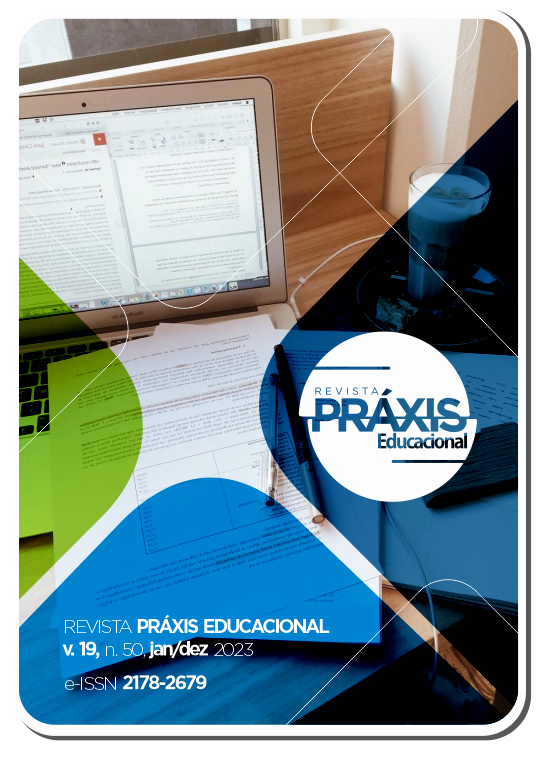Decolonize the languages of the powers
DOI:
https://doi.org/10.22481/praxisedu.v19i50.11997Keywords:
colonization of thought, diverter, divert, emancipatory education, languages of powersAbstract
Decolonizing thought, decolonizing education, decolonizing all forms of submission involves decolonizing the languages of powers, since subjugated under the languages of the powers and with colonized times we can do little to free ourselves, to emancipate ourselves. It proposes a journey to linguistic decolonization, whose central hypothesis is: every form of colonization is protected by a linguistic structure that the oppressors cannot decipher. Among several conclusions we highlight that any struggle for equity, equality, justice, freedom, and happiness is impossible if we do not change the languages that the powers impose on us.
Downloads
References
De la Vega, Eduardo (2014). Diversos y colonizados. Rosario: Homo Sapiens Editores.
Fano, Frantz (1983). Los condenados de la tierra (7ª. ed.). México: Fondo de Cultura Económica.
Freire Paulo. (2011). Pedagogía de la esperanza. México: Siglo XXI.
García Canclini, Néstor. (2007). Diferentes, desiguales y desconectados. España: Gedisa
Geertz, Clifford. (1996). Los usos de la diversidad. Barcelona: Ediciones Paidós.
González, Miguel Alberto G. (2014). Miedos y olvidos pedagógicos. Rosario: Homosapiens. Recuperado de http://www.researchgate.net/publication/270341600_Miedos_y_olvidos_pedaggicos.
González, Miguel Alberto G. (2017). Diálogos de saberes. Las homogeneizaciones-diversidades y las exclusiones-inclusiones en la educación colombiana, narrativas autobiográficas. ISBN: 0798-9792. Revista de Pedagogía, 38 (103), 209-247.
González, Miguel Alberto G. (2020). Aprender a vivir juntos. Lenguajes para pensar diversidades e inclusiones. Buenos Aires: Noveduc.
González, Miguel Alberto G. (2021a). Aporobiografía. Testimoniar nuestras fragilidades. México: Ipecal.
González, Miguel Alberto G. (2021b). Tiempos intoxicados en sociedades agendadas. Sospechar un poco del tiempo educativo. Bogotá: Desde abajo.
Grosfoguel, Ramón. (2011). Racismo epistémico, islamofobia epistémica y ciencias sociales coloniales. Tabula Rasa, 14, 341-355.
Lamus Canavate, Doris. (2007). Diálogos descoloniales con Ramón Grosfoguel: Trasmodernizar los feminismos. Tabula Rasa, 7, 323-340.
León-Sánchez, Mario; Sevillano-Monje, Verónica; González-Monteagudo, José; Zamora-Serrato, Miriam. (2021). Enfoques interculturales para una escuela inclusiva: debates teóricos y propuestas prácticas. En C. Solís-Espallargas, O. Moreno-Fernández, M. Ferreras-Listán, P. A. Moreno-Crespo (Eds.). Innovación, formación y transformación en la práctica docente. Efecto mariposa (pp. 91-103). Madrid: Pirámide.
Ranciere, Jacques. (2016). El maestro ignorante. Buenos Aires: Libros el Zorzal.
Skliar Carlos. (2017). Pedagogías de las diferenicas. Buenos Aires: Noveduc.
Sousa Santos, Boaventura (2006). Conocer desde el Sur. Para una cultura política emancipatoria. Lima: Programa de Estudios sobre Democracia y Transformación Global.
Sousa Santos, Boaventura. (2010). Descolonizar el saber. Montevideo: Ediciones Trilce.
Thiong’o, Ngũgĩ wa. (2015). Descolinizar la mente. Barcelona: Penguim Random House.
Walsh, Catherine (2012). Inerculturalidad y (de)colonialidad: Perspectivas críticas y políticas. Visão Global, 15 (1-2), 61-74.
Zemelman, Hugo (2002). Necesidad de conciencia. Barcelona: Anthropos.
Downloads
Published
Issue
Section
License
Copyright (c) 2023 Práxis Educacional

This work is licensed under a Creative Commons Attribution-ShareAlike 4.0 International License.
Você é livre para:
Compartilhar - copia e redistribui o material em qualquer meio ou formato; Adapte - remixe, transforme e construa a partir do material para qualquer propósito, mesmo comercialmente. Esta licença é aceitável para Obras Culturais Livres. O licenciante não pode revogar essas liberdades, desde que você siga os termos da licença.
Sob os seguintes termos:
Atribuição - você deve dar o crédito apropriado, fornecer um link para a licença e indicar se alguma alteração foi feita. Você pode fazer isso de qualquer maneira razoável, mas não de uma forma que sugira que você ou seu uso seja aprovado pelo licenciante.
Não há restrições adicionais - Você não pode aplicar termos legais ou medidas tecnológicas que restrinjam legalmente outros para fazer qualquer uso permitido pela licença.












